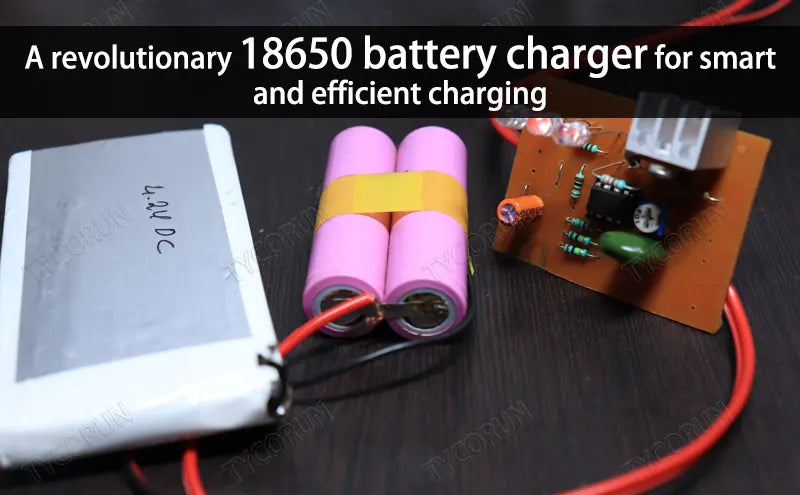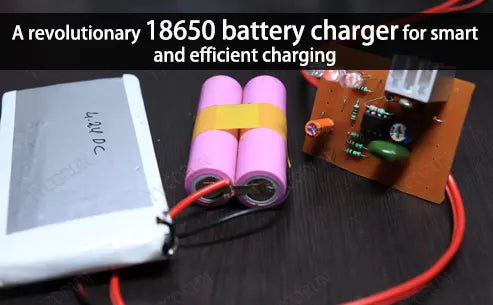
Main content:
- Brief introduction of 18650 battery
- Do 18650 batteries need a special charger
- How long does the 18650 battery take to charge
- What is the current for the 18650 battery charger
- What are the models of the 18650 battery charger
- Can I charge 18650 with 5V
- Precautions for charging the 18650 battery with a charger
- How to choose the best 18650 battery charger
- How to make a 18650 battery charger
- Conclusion
The 18650 battery charger is a useful device that plays a crucial role in keeping electric devices running smoothly. This article well explains the 18650 battery charger.
1. Brief introduction of 18650 battery
A device used to recharge 18650 lithium-ion batteries is known as a 18650 battery charger. Once these rechargeable batteries run out of energy, it is utilized to refuel them. The 18650 batteries can be put into one or more slots to charge. A power source, such as a wall outlet or a USB port, is connected to the charger to provide the required electricity for charging the batteries.
The nominal voltage of NMC battery cell is between 3.6 and 3.7V, which is much higher than the 1.2 voltage of nicd vs nimh battery. To avoid overcharging, which can result in battery damage, a shorter lifespan, and even safety risks, it is essential to keep an eye on the voltage while the battery is being charged.
Remembering that a 18650 battery's voltage might fluctuate somewhat based on elements like its exact chemistry and charge state is vital. Lithium-ion batteries, such as 18650 cells, have a reasonably flat discharge curve, meaning that their voltage does not change particularly much during the discharge cycle.
The current flowing into the battery throughout the charging procedure is the charging current, measured in amperes or A. Based on the battery's capacity and the producer's recommendations, the ideal charging current for 18650 batteries is determined. For 18650 batteries, the typical charging current ranges from 0.5A to 2.0A. However, it's important to check the battery's datasheet and recommendations for exact figures.
2. Do 18650 batteries need a special charger
Yes, an exclusive charger is needed for 18650 batteries because of their distinctive qualities and the dangers that might result from wrong charging. The 18650 batteries are common lithium-ion batteries used in many electric products, such as laptops, power banks, and vaporizers.

Their chemical composition necessitates certain charging considerations to guarantee safety, efficiency, and lifespan. Specifically, the 18650 battery requires a specific 18650 battery charger for the following reasons.
First, voltage and current control are essential for properly charging 18650 batteries. Without adequate control, batteries may be overcharged, resulting in overheating, thermal runaway, and even the possibility of an explosion or fire. A specialized charger meticulously controls the charging process, ensuring that the battery receives the right voltage and amperage throughout the charging cycle.
Secondly, the charging algorithm is crucial for lithium-ion batteries. For these batteries to operate at their best and last longer, particular charging profiles are needed. Standard chargers could not offer the required charging algorithm, which might impact battery capacity and hasten battery deterioration.
Thirdly, certain 18650 batteries have integrated protective circuitry to defend against short circuits, overcharging, and over-discharging. These protective circuits may connect with a specialized charger, guaranteeing secure and effective battery charging.
3. How long does the 18650 battery take to charge
The battery capacity, current charge level, charger characteristics, and current may all affect how long it takes to charge a 18650 battery. The majority of 18650 batteries typically have capacities between 2000mAh and 3500mAh. An empty 18650 battery may need 2 to 3 hours to fully charge when using a basic charger with a normal charging current of 1A.

However, the charging time can be greatly shortened and may only require one to two hours for a full charge if you use a higher-current charger, such as one that operates at 2A or 3A. Using a high-quality 18650 battery charger with safety features and a design for 18650 batteries will assist in ensuring a secure and effective charging procedure.
4. What is the current for the 18650 battery charger
To know the current for 18650 battery charger, most 18650 batteries can generally be charged securely using currents between 0.5A and 2A. An ideal charging current range for 18650 batteries with smaller capacities is between 0.5A and 1A. For these batteries, charging at a lower current can be advantageous as it lowers the chance of overheating and increases battery life.
It is possible to utilize a charging current of 1A to 2A for 18650 batteries with larger capacity. However, the companies instructions must be followed as some bigger-capacity batteries may call for a lower maximum charging current.
5. What are the models of the 18650 battery charger
The market for 18650 battery charger has a wide range of products to meet different demands and specifications. These chargers are made especially for charging 18650 lithium-ion batteries, frequently found in various electronic products. The capacity, number of charging ports, charging speed, and other aspects of the offered models may vary.
While more sophisticated chargers could have multi-slot charging capabilities, allowing users to charge numerous batteries simultaneously, other devices have single or dual slots and a simple charging mechanism.

Certain models also have cutting-edge safety features like temperature monitoring, short circuit avoidance, and overcharge protection to ensure secure and effective charging. Additional features include adjustable charging currents for improved control and compatibility with battery types and the LCD screens that show real-time battery condition information.
6. Can I charge 18650 with 5V
Doing so calls for careful planning and the use of the right charging circuits. For 18650 battery charger to charge, the normal voltage range does not exceed 4.2V. Because 5V is higher than this range, charging 18650 batteries directly with a 5V power source without any control can be risky, resulting in battery damage, decreased performance, or even possible risks like overcharging, overheating, or leaking.
It’s better to Use a special charging circuit to control the voltage to the required ranges to properly charge 18650 batteries. Most 18650 battery charger today are built to complete this duty because they include the essential voltage regulation and safety features to guarantee a managed and secure charging procedure. If you are not sure, try to go to the battery stores nearby.
In addition, certain gadgets or power banks could come with built-in 18650 batteries with a 5V output connection for charging additional gadgets. In these circumstances, the device's internal circuitry controls the voltage and guarantees that the 18650 batteries are charged safely.
7. Precautions for charging the 18650 battery with a charger
Although using a specialized charger to charge 18650 batteries is a widespread practice, a few safety considerations must be taken to ensure battery performance and safety. Some crucial safety measures to remember when a 18650 battery charger is used for charging, verify compatibility, read the instruction manual, avoid overcharging, charging environment, temperature monitoring, and unplug after charging.
8. How to choose the best 18650 battery charger
To guarantee safety, effectiveness, and simplicity, selecting the finest 18650 battery charger needs to consider several important variables.

- Check the charger's compatibility with batteries' lithium-ion chemistry, size (18650), and capacity.
- Determine how many batteries you need to charge using the charging slots. Chargers can be single-slot, dual-slot, or multi-slot chargers, among other variations.
- Search for a charger that offers quick charging times without sacrificing security. Some chargers prioritize a slower, more cautious charging rate for battery longevity, while others provide quick charging alternatives.
- Choose a charger with built-in safety features like temperature monitoring, reverse polarity protection, overcharge protection, and short circuit avoidance. These features increase battery life and assist in preventing accidents.
- Portable chargers with folding prongs or USB compatibility are best if you require a charger on the road.
- Read customer reviews and feedback to learn about other people's experiences with the charger you are thinking about.
- While keeping your budget in mind, put safety and performance above getting the best deal.
9. How to make a 18650 battery charger
It takes a basic grasp of electronics and safety considerations to build an 18650 battery charger. Remember that creating a charger involves handling electricity, which can be hazardous if not done correctly. Buying a professional 18650 battery charger is safer if you are unfamiliar with electronics. However, if you possess the required abilities and information, the following is a basic plan for building a straightforward 18650 charger:

If you're using a TP4056 module or one similar, prepare the charging module by identifying the charging and output terminals. These modules often contain the indications "B+" (Battery+), "B-" (Battery-), "IN+" (Input+), and "IN-" (Input-).
- Solder wires to the cathode and anode of the 18650 battery holder to assemble the battery holder.
- Put the cathode wire in the charging module's "B+" terminal and the anode wire in the "B-" terminal.
- Solder the "IN+" and "IN-" terminals of the charging module to the cathode and anode wires of the power source (micro-USB connector or DC power jack), respectively.
- Add the proper resistors to the charging module by the datasheet if you need to alter the charging current.
- Use heat-shrink tubing or insulating materials to cover exposed wires and stop short circuits.
- If you're utilizing a PCB board, secure every component on it.
- Double-check all connections before placing the charger and placing the 18650 batteries in its holder for testing. Make sure the charging process is running properly by keeping an eye on it.
10. Conclusion
This article mainly introduces 18650 charger and how to choose it. The special charger is needed for the safety and high effective charging, which also owns the fuction to prevent overcharging as well as monitor extreme temperature. Besides, to make a 18650 battery charger by yourself correctly and specifically is also mentioned. If you’ve read all the content of this article, you will benefit more about 18650 battery charger.
Related articles: Top 10 lithium battery companies in the world, lithium vs alkaline batteries, best place to buy 18650















